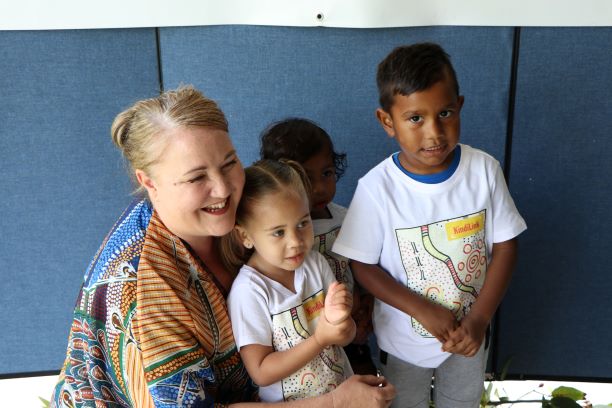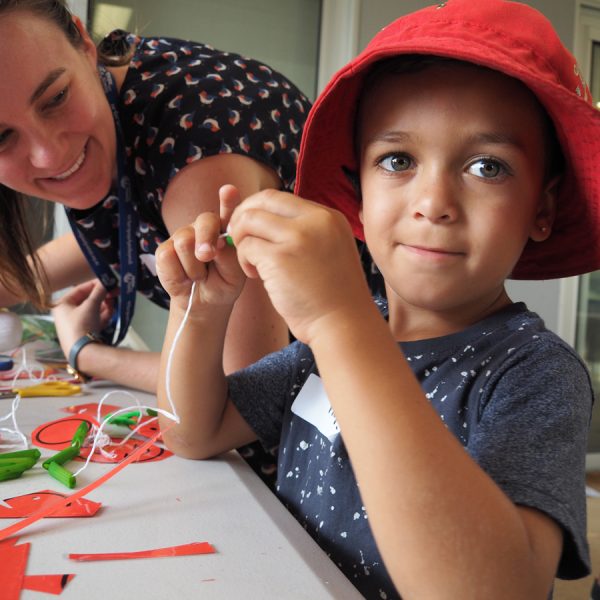PECE – the program making a difference in educator and community connections

A trial of the Positive Early Childhood Education Program (PECE), an initiative of the Parenting and Family Support Centre (PFSC) at The University of Queensland, is having positive impacts across the West Australian Wheatbelt via the KindiLink program.
The Sector spoke with Andrea Cowcher, a KindiLink Early Childhood Educator at Narrogin Primary School, about PECE and how it is transforming community connections in Narrogin, a large town in the Wheatbelt region of Western Australia, 192 km southeast of Perth on the Great Southern Highway between Pingelly and Wagin.
What is the PECE program?
PECE is a parallel program to the Triple P–Positive Parenting Program and has 22 core strategies, many of which overlap with other Triple P interventions.
The PECE program supports those working in early childhood education to create a strong foundation for families to build up the consistency and broader positive outcomes which are created through an interlinked rollout of the Triple P – Positive Parenting Program.
PECE has been developed by Triple P’s Professor Matt Sanders and a team of University of Queensland colleagues (Associate Professor Karen Turner, Dr Cassandra Dittman, and US-based researcher Dr Julie Rusby). For the past six years, Canadian researcher Dr Shawna Lee has conducted evaluation trials into the success of Triple P interventions. The outcome of those evaluations is a program designed for early childhood educators, based on research about what works to maintain a calm and positive atmosphere in long day care centres.
Integration with KindiLink services
KindiLink is a play-and-learn initiative for Aboriginal and Torres Strait Islander children who are not yet old enough to enrol in school.
Children attend with a parent/carer for six hours a week, at no cost to families, and engage in high-quality play-and-learn sessions on school grounds. Families are supported by a teacher and an Aboriginal and Islander Education Officer (AIEO) to be actively involved in the activities with their children.
Recently, Triple P conducted a trial of PECE with four KindiLink services in the WA Wheatbelt.
Outcomes of integration
Throughout the trial, PECE has enhanced the capacity of educators to support the children’s learning experiences, build the social and behavioural competence of the children in their care, and build up Kindilink as a community hub for local families.
As the educators have strived to embed local language and culture into everyday learning, the program’s popularity in the community has grown. When the present teacher began with the program three years ago, there were only one or two families who regularly attended sessions. This has now grown to more than 20 enrolled families, many of whom are regular attendees, including a number of local dads.
The key, Mrs Cowcher said, is to respect families, and recognise them as the first and most important educators of their children, acknowledging, valuing and using the strengths, skills and experiences that they bring with them to the KindiLink program.
Once families have engaged with the program, facilitators approach the families in the community, acknowledging them, remembering their children, and engaging with them. Facilitators strive to be supportive, non-judgemental and empathetic of people’s situations and experiences.
“An absolute breakthrough moment was when I brought along my then three-year-old boy who was (and still is) a boisterous, busy boy,” said Mrs Cowcher.
“He was running an absolute muck during a session and I said…‘oh shame,’ the mums all laughed, from that point they saw me as a mum just like them, dealing with the same issues and being there without judgment. I still often tell stories of my boys and what they are up to and the mischief they get into.”
Ideas for other services
We asked Mrs Cowcher for her suggestions to support fellow early childhood professionals who are seeking to build deeper connections with those in their community, especially for those who are working in communities with low engagement in early learning services.
She had the following advice:
- Create Play and Learn Packs containing different learning games and all the materials they may need to do them, for example, jelly crystals, bubbles, paving chalk, a colouring book, textas, a picture book, and a flyer with KindiLink days and times.
- Attend all community events with flyers and play and learn packs to give out.
- Do home visits if people are new to town or touch base with families we may not have seen for a while.
- Drop off play and learn packs to the women’s refuge once a term.
- Create KindiLink t-shirts for the KindiLinkers. Mrs Cowcher ran a competition with the local high school to design a tshirt, and the parents chose the design they liked the best to become the KindiLink uniform. The families love the t-shirts and wear them proudly.
- Hold attendance raffles a few times a term. Families receive a ticket to put in the draw at each session they attend. Mrs Cowcher approached local businesses for donations to make hampers as prizes.The local Sportspower, craft shops, butcher, Toyworld and many more have been involved. The businesses receive a certificate of thanks for their donation, and they always display them in their shops.
- Hold regular cooking sessions and morning teas.
- Invite guest speakers or visitors such as Bill Dempsey, the football legend.
- Celebrate occasions like NAIDOC, Easter hunts, Christmas party in the park and Children’s week.
- Go ‘On Country’ and have sessions outdoors. Mrs Cowcher said that these are always very popular where whole families come along – Nan, Pop, cousins, aunties and uncles. She aims to do these at least once a term.
- Hold special events like messy play or water slide days.
- Run a closed Facebook page to post photos or videos from the day’s sessions, information about upcoming events and where parents can share ideas, ask questions, or give feedback.
- Offer pick up and drop off services for families that need a ride. Mrs Cowcher said that often families that come in their own vehicle have to follow the bus home in their cars as their children want to go on the bus.
- Text families the morning of every session to remind them.
In a follow up piece with Mrs Cowcher, The Sector will explore the PECE pilot in more detail, including how the service works to make connections with fathers, suggestions on respectfully building parent capacity, social and behavioural changes, and, most importantly, how services can become involved in the PECE program for themselves.
For further information about PECE, please see here, or contact your local PECE team via email to [email protected] or by phoning 1300 846 811.
Popular

Workforce
Quality
Research
When did it start to go wrong?
2025-12-18 08:00:46
by Fiona Alston

Policy
Economics
Jobs News
Provider
Workforce
Children’s Services Award changes finalised to address gender-based undervaluation
2025-12-12 06:58:10
by Fiona Alston

Economics
Provider
Quality
Jobs News
Policy
Practice
Workforce
The year in review: 2025's most impactful ECEC news stories and shifts
2025-12-16 07:32:18
by Fiona Alston
















